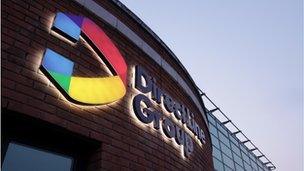Direct Line shares rise on first day of trading
- Published

Shares in insurer Direct Line have risen 8% in limited trading after Royal Bank of Scotland (RBS) floated the firm on the London Stock Exchange.
RBS sold 30% of the company for £787m or 175 pence a share, valuing the whole company at £2.63bn.
Private investors bought an unusually large chunk of the issue.
RBS must sell Direct Line as a European Commission condition for the £45bn of support the UK government gave it after the 2008 financial crisis.
The share offering received some 25,000 applications from ordinary retail investors in the UK, and 15% of the shares sold were allotted to them.
The rest of the shares went to large institutional investors in the UK, US and continental Europe.
"I think it's an investment that people can actually relate to," Catherine Barton, a partner in accountants Ernst & Young's insurance team, told the BBC. "They have some strong brand names in the market."
As well as its own brand, Direct Line Group also owns the Churchill and Privilege insurance brands, and the Green Flag car breakdown service, and it has more than four million motor insurance customers and a similar number of home insurance policies.
The company is also thought to be considering introducing legal services alongside its insurance products.
Sale deadline
The shares began limited trading in London on Thursday morning, rising to 188p by the end of the day.
Unconditional trading in the shares is expected to begin on Tuesday 16 October.
The 175p flotation pricing was at the mid-point of the price range previously indicated to interested investors by RBS.
The state-owned bank has the right to sell an additional 4.5% of the insurance company's total shares in the stock market flotation, in order to meet surplus investor demand for the shares.
Assuming it does so, RBS will be left with a 65% stake in Direct Line.
It is required to sell a majority of Direct Line by the end of next year, and all of it by the end of 2014.
"The successful offering rests on outstanding effort by the Direct Line management team to re-position the business, while also gearing up to the demands of being a separate public company," said RBS group finance director Bruce van Saun.
Direct Line said it had been run on a "substantially standalone basis" since the summer.
'Struggling' market
Direct Line was started 25 years ago.
Last month, Direct Line, which employs 15,000 staff, said it would cut 900 jobs to save money.
It was one of a series of cost-saving moves by the company, which is planning to make savings of £100m a year.
"The motor insurance market has really struggled over the last several years," said Catherine Barton of E&Y. "For every pound in premium being charged there was around £1.20 of claims being made.
"But the market has made a big improvement in performance," she added, noting that 10 out of the top 20 insurers made a profit this year.
Another worry for the firm is an investigation launched by the Competition Commission into the referral fees that solicitors pay to insurers for handling claims.
However, Catherine Barton pointed out that, even if this market practice were clamped down on, it may actually help an insurer such as Direct Line, because in the past such referrals have encouraged additional claims and caused the cost of claims for insurers to spiral.
- Published28 September 2012
- Published14 September 2012
- Published5 September 2012